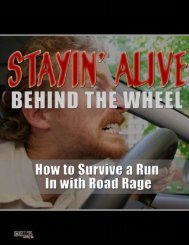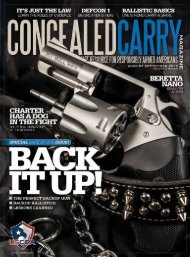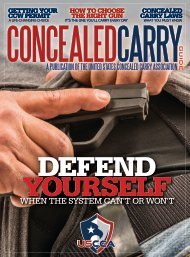Download This Issue - US Concealed Carry
Download This Issue - US Concealed Carry
Download This Issue - US Concealed Carry
You also want an ePaper? Increase the reach of your titles
YUMPU automatically turns print PDFs into web optimized ePapers that Google loves.
...IT’S J<strong>US</strong>T THE LAW<br />
equivalent.” ROR means released on<br />
a handshake promise to appear. “Ten<br />
percent equivalent” means that if the<br />
citizen posts ten percent of the amount<br />
of the bond, he gets out. If he appears at<br />
trial, he gets the ten percent bond back.<br />
As this is the amount bondsmen charge,<br />
they hate this program.<br />
If bond remains too high following arraignment,<br />
it can be addressed in more<br />
detail at a bond hearing set for that purpose.<br />
Before forcing a citizen to spend vast<br />
sums for a trial, and perhaps months in<br />
jail awaiting trial, the government must<br />
first prove it has a good reason. There are<br />
two ways to bind a defendant over for a<br />
trial; preliminary hearing and grand jury<br />
hearing. Both must be before a “neutral<br />
magistrate.” Arraignment will be followed<br />
within a month by a preliminary<br />
hearing. Such hearings may be set earlier<br />
for incarcerated defendants. The<br />
purpose of the preliminary, known as<br />
the “prelim” by denizens of the system,<br />
is to protect the citizen by determining<br />
if there is any evidence supporting<br />
the charges brought by the police and<br />
prosecutor. Specifically, the judge at the<br />
hearing must determine if there is some<br />
reason to believe a crime was committed<br />
and some reason to believe the guest of<br />
honor committed it. While a theoretical<br />
safeguard, very few defendants win preliminary<br />
hearings. The preliminary hearing<br />
is an opportunity for the defense to<br />
learn something about the prosecution<br />
case. Defendants may be asked to waive<br />
preliminary hearing. If they do not, the<br />
case will be presented to a Grand Jury,<br />
the defendant re-arrested and forced to<br />
post another bail bond.<br />
Some prosecutor’s offices avoid preliminary<br />
hearings through indictments<br />
before the Grand Jury. Grand Juries<br />
are secret proceedings where only the<br />
prosecutor produces evidence. The defendant<br />
has no right to introduce evidence,<br />
and may not even know that he<br />
is a subject of interest. While very few<br />
defendants win preliminary hearings,<br />
virtually no defendant wins a Grand Jury<br />
hearing. The saying is that a Grand Jury<br />
will indict a ham sandwich. There was<br />
an instance of a Texas Ranger who killed<br />
an assailant in the city street, while the<br />
Grand Jury watched from the second<br />
floor of the Courthouse. With this first<br />
hand information, they returned a “No<br />
True Bill” (no crime) before his wounds<br />
were treated. 2 <strong>This</strong> is not something the<br />
average citizen can expect. In the old “LA<br />
Law” series a lawyer killed an assailant,<br />
voluntarily appeared before the Grand<br />
Jury and was exonerated. <strong>This</strong> series was<br />
fiction. There is a name for persons appearing<br />
before a Grand Jury in the naïve<br />
belief that they only need to tell the<br />
truth, they are called “inmates.” The<br />
Grand Jurors will be indoctrinated by<br />
the prosecutor. There is no beating this<br />
system. It is ironic that Grand Juries are<br />
The defendant has<br />
no right to introduce<br />
evidence, and may not<br />
even know that he is a<br />
subject of interest.<br />
constitutionally guaranteed, in the federal<br />
system, but preliminary hearings are<br />
more to the defense benefit.<br />
If a defendant wins a preliminary<br />
hearing, or the prosecutor does not<br />
press the grand jury to return an indictment,<br />
this usually, but does not always,<br />
end the matter. Double jeopardy does<br />
not apply unless a trial jury is selected. A<br />
prosecutor may therefore take a case lost<br />
at preliminary hearing or which a grand<br />
jury has returned a “No True Bill,” and<br />
re-submit the matter to the grand jury<br />
as often as desired. It is wise not to spark<br />
that desire.<br />
After shooting four muggers in a New<br />
York subway, Bernard Goetz won his first<br />
trip to the grand jury; he then, however,<br />
made the politically incorrect suggestion<br />
that guns be distributed to civilians.<br />
His lawyer, on “Face the Nation” stated<br />
that Mr. Goetz felt no remorse about the<br />
shootings. A neighbor alleged that he<br />
had made racist statements. Any one of<br />
these statements would have aroused<br />
criticism of the prosecution; together<br />
they inspired a full-scale effort to send<br />
Mr. Goetz to prison. 3 A new grand jury<br />
was given an improper definition of selfdefense,<br />
and indicted Mr. Goetz for everything<br />
the prosecution requested.<br />
On 11 October, 1981 a man entered<br />
a tavern and attacked two patrons with<br />
a hatchet; he was promptly shot and<br />
killed. The following day the Kansas City<br />
Star described the assailant as the “victim,”<br />
and the man who defended himself<br />
as the “gunman,” a la Billy the Kid.<br />
<strong>This</strong> terminology stands law and common<br />
sense on its head. Unfortunately,<br />
this terminology has been common in<br />
the media. Following a defensive gun<br />
use the media will give the “gunman” an<br />
“opportunity to tell his side of the story.”<br />
One homicide detective referred to them<br />
as “vultures.” They thrive on sensationalism,<br />
which is never good for the defense.<br />
It may be useful to tell the truth, but<br />
simply telling the truth rarely helps, it is<br />
how the truth is told that makes it useful.<br />
Lawyers are authorities on how to tell the<br />
truth.<br />
A suspect has the absolute right to<br />
an attorney at any step in the criminal<br />
justice system under the sixth (and<br />
fourteenth) amendment to the U.S.<br />
Constitution. No matter how innocent<br />
the citizen might be, no matter how<br />
knowledgeable, an attorney is required.<br />
For a layman to search for justice in the<br />
thickets of the law is akin to going on safari<br />
without equipment, with no idea of<br />
what the game looks like and no guide<br />
where game might be found. H<br />
Kevin L. Jamison is an attorney in the<br />
Kansas City Missouri area concentrating<br />
in the area of weapons and self-defense.<br />
Please send questions to Kevin L.<br />
Jamison 2614 NE 56 th Ter Gladstone<br />
Missouri 64119-2311 KLJamisonLaw@<br />
earthlink.net. Individual answers are not<br />
usually possible but may be addressed in<br />
future columns.<br />
<strong>This</strong> information is for legal information<br />
purposes and does not constitute<br />
legal advice. For specific questions you<br />
should consult a qualified attorney.<br />
1. The conundrum of calling the police and at the same time remaining silent is discussed in Alan Korwin’s After You Shoot, Bloomfield Press Scottsdale, AZ<br />
2011. An evaluation of this work is forthcoming.<br />
2. Jenkins & Frost I’M FRANK HAMER, State House Press, Austin Texas 1993 at 72.<br />
3. Fletcher A CRIME OF SELF DEFENSE, The Free Press, N.Y. 1988 at 5.<br />
MAY/JUNE 2011 n CONCEALED CARRY MAGAZINE n <strong>US</strong>CONCEALEDCARRY.COM<br />
61
















